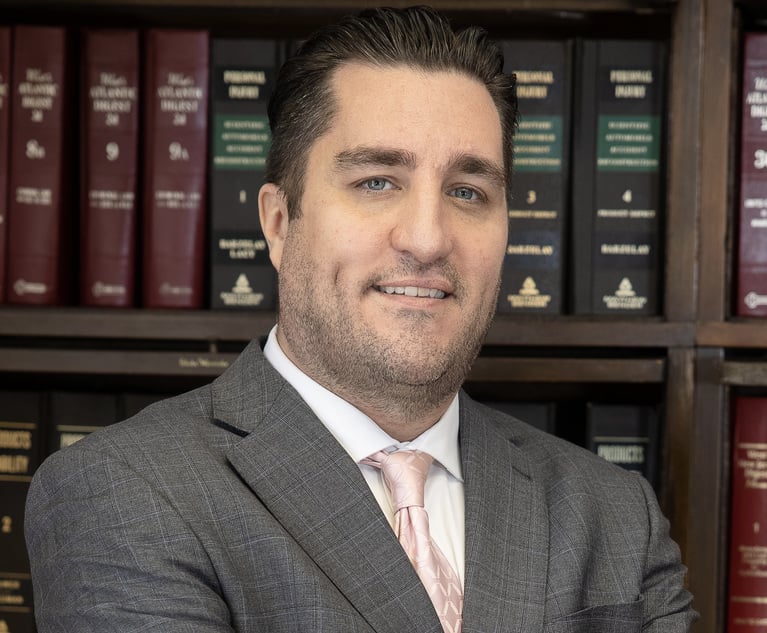NJ Attorney General Ordered to Comply With $1.3M Whistleblower Settlement
A Superior Court judge in Camden has ordered the New Jersey Attorney General's office to stand by its agreement to pay $1.3 million to settle a suit by a former detective who said he suffered retribution for reporting sexual harassment.
March 07, 2018 at 03:49 PM
6 minute read
 Photo: Bigstock
Photo: Bigstock A Superior Court judge in Camden has ordered the New Jersey Attorney General's office to stand by its agreement to pay $1.3 million to settle a suit by a former detective who said he suffered retribution for reporting sexual harassment.
Judge Francisco Dominguez, in a March 2 order, said the state must honor settlement terms that its attorney agreed to in court. The judge granted the plaintiff's motion to enforce the settlement and rejected a series of additional provisions that the state sought to impose on the plaintiff in Stopko v. New Jersey Attorney General's Office, finding they were not part of the settlement that was placed on the record on Jan. 23. The additional terms sought by the state included a bid to make the entire award taxable.
The suit claimed, under the Conscientious Employee Protection Act, that Keith Stopko's adverse treatment in retaliation for disclosing unlawful and unethical conduct by colleagues caused him to suffer depression, embarrassment, humiliation, mental anguish, diminished earning capacity and constructive or actual firing.
On Feb. 23, after a jury was selected, the state agreed to pay $1.3 million to settle claims that Stopko was placed on a promotion blacklist and moved to less-desirable assignments after telling superiors of allegations that others made to him about John Torrey, a lieutenant in the Division of Criminal Justice.
The agreement called for a release to be executed within five days, but the state asked plaintiff's counsel to sign a release that included terms not discussed when the settlement was placed on the record before Dominguez. The state sought to add terms restricting Stopko's future employment in state government and his ability to obtain a retired law enforcement officer's gun permit and issues related to taxation of the award.
The state also sought to change the payment terms in the settlement from 30 days to a 60-day time period or “as soon as practical,” Stopko's lawyer, Jonathan Cohen, head of a Philadelphia firm, said in court papers.
Under the March 2 order, Stopko agreed to a request from the state, calling for him to designate $300,000 of the award money as back pay, subject to withholding of taxes. The state had insisted after the settlement was reached in court that the entire $1.3 million would be subject to withholding.
Stopko, who headed an anti-gang unit in the attorney general's Cherry Hill office, said in the suit that he notified his boss of reports accusing Torrey of sexually harassing female detectives.
Stopko told his supervisor, Alan Buecker, that Torrey told one detective to falsify an investigative report. According to the complaint he also told Buecker that Torrey placed detectives in danger by violating standard operating procedure regarding safety of undercover officers. The complaint said Buecker had told Stopko he would see that a complaint was filed with a state equal employment opportunity office. But Stopko later learned that no such report was made, according to the suit.
In September 2011, Stopko applied for a promotion to lieutenant, but in March 2012 he was notified that he was excluded from the interview process. That same month, he was transferred from the gangs and organized crimes unit to the human trafficking unit.
In April 2012, Torrey was dismissed from the Attorney General's Office, the suit said.
In June 2012, the suit claimed, Buecker called Deputy Attorney General Russell Curley and asked him to decline to prosecute a narcotics case that Stopko had investigated, saying Stopko “did not know what he was doing.” But the case nonetheless proceeded and resulted in several prosecutions, according to the suit. In June 2012, Stopko learned from a colleague that Buecker had discussed “paybacks” for those who went against Torrey. And in December 2012, Curley notified Stopko that he was on a “blacklist” and would never be promoted. Curley advised Stopko to make amends with Buecker, “because he could destroy you and your career,” Stopko claimed.
In January 2013, Stopko, a Toms River, New Jersey, resident, was transferred to a multiagency task force in Atlantic City. That same month, he was stripped of his acting lieutenant status and his administrative duties were taken away.
Later that month, he went on a 90-day stress leave on advice of his doctor, and he did not return to work after that, maintaining he was subject to constructive termination, according to the suit.
The defendants were expected to argue at trial that Stopko walked away from his job without justification and therefore did not deserve any back pay, Cohen said in court papers.
The settlement in the whistleblower suit would help his client prevail in a separate dispute over his pension, Cohen said.
Cohen said in court papers opposing the attorney general's bid to impose additional terms on the settlement that the state's demand to impose taxes on the entire $1.3 million appeared to be an effort “to drag the parties and this Court into protracted litigation over the 'unclear' taxability of a lump sum CEPA settlement, which is a matter between the plaintiff, his tax adviser, and the IRS, and not the defendants, and which cannot be litigated now.”
Torrey had been named as a defendant in Stopko's suit, but was let out of the case. Torrey also filed his own suit against the Attorney General's Office and several of his superiors, raising due process claims and conspiracy claims over his firing. U.S. District Judge Peter Sheridan dismissed that case in March 2017 and the U.S. Court of Appeals for the Third Circuit affirmed the decision in December 2017.
Cohen said he has no idea why the Attorney General's Office changed its stance on settlement terms. He said the state's attempt to deem the entire settlement payment as taxable suggested to him that someone working for the state sought to use a standard employment release in place of a release written for a whistleblower case. In a typical employment case, the damages are all lost wages, and are by definition taxable, while a whistleblower case is a tort case where damages include nontaxable compensation for emotional distress, Cohen said.
“I can't even begin to explain why this happened,” Cohen said.
The transition to Attorney General Gurbir Grewal from his predecessor, Christopher Porrino, had no effect on the case because Grewal had taken office when the initial settlement terms were approved, Cohen said.
Richard Goldstein of Marshall Dennehey Warner Coleman & Goggin in Cherry Hill, New Jersey, who represented the state, and Evan Crook of Capehart Scatchard in Mount Laurel, New Jersey, who represented Buecker, did not return calls.
A spokesman for the Attorney General's Office, Lee Moore, declined to comment on the case.
This content has been archived. It is available through our partners, LexisNexis® and Bloomberg Law.
To view this content, please continue to their sites.
Not a Lexis Subscriber?
Subscribe Now
Not a Bloomberg Law Subscriber?
Subscribe Now
NOT FOR REPRINT
© 2025 ALM Global, LLC, All Rights Reserved. Request academic re-use from www.copyright.com. All other uses, submit a request to [email protected]. For more information visit Asset & Logo Licensing.
You Might Like
View All
An Overview of Proposed Changes to the Federal Rules of Procedure Relating to the Expansion of Remote Trial Testimony
15 minute read
Appellate Division Rejects Third Circuit Interpretation of NJ Law, Says No Arbitration for Insurance Fraud
4 minute read

'Go 12 Rounds' or Settle: Rear-End Collision Leads to $2.25M Presuit Settlement
Trending Stories
- 1How ‘Bilateral Tapping’ Can Help with Stress and Anxiety
- 2How Law Firms Can Make Business Services a Performance Champion
- 3'Digital Mindset': Hogan Lovells' New Global Managing Partner for Digitalization
- 4Silk Road Founder Ross Ulbricht Has New York Sentence Pardoned by Trump
- 5Settlement Allows Spouses of U.S. Citizens to Reopen Removal Proceedings
Who Got The Work
J. Brugh Lower of Gibbons has entered an appearance for industrial equipment supplier Devco Corporation in a pending trademark infringement lawsuit. The suit, accusing the defendant of selling knock-off Graco products, was filed Dec. 18 in New Jersey District Court by Rivkin Radler on behalf of Graco Inc. and Graco Minnesota. The case, assigned to U.S. District Judge Zahid N. Quraishi, is 3:24-cv-11294, Graco Inc. et al v. Devco Corporation.
Who Got The Work
Rebecca Maller-Stein and Kent A. Yalowitz of Arnold & Porter Kaye Scholer have entered their appearances for Hanaco Venture Capital and its executives, Lior Prosor and David Frankel, in a pending securities lawsuit. The action, filed on Dec. 24 in New York Southern District Court by Zell, Aron & Co. on behalf of Goldeneye Advisors, accuses the defendants of negligently and fraudulently managing the plaintiff's $1 million investment. The case, assigned to U.S. District Judge Vernon S. Broderick, is 1:24-cv-09918, Goldeneye Advisors, LLC v. Hanaco Venture Capital, Ltd. et al.
Who Got The Work
Attorneys from A&O Shearman has stepped in as defense counsel for Toronto-Dominion Bank and other defendants in a pending securities class action. The suit, filed Dec. 11 in New York Southern District Court by Bleichmar Fonti & Auld, accuses the defendants of concealing the bank's 'pervasive' deficiencies in regards to its compliance with the Bank Secrecy Act and the quality of its anti-money laundering controls. The case, assigned to U.S. District Judge Arun Subramanian, is 1:24-cv-09445, Gonzalez v. The Toronto-Dominion Bank et al.
Who Got The Work
Crown Castle International, a Pennsylvania company providing shared communications infrastructure, has turned to Luke D. Wolf of Gordon Rees Scully Mansukhani to fend off a pending breach-of-contract lawsuit. The court action, filed Nov. 25 in Michigan Eastern District Court by Hooper Hathaway PC on behalf of The Town Residences LLC, accuses Crown Castle of failing to transfer approximately $30,000 in utility payments from T-Mobile in breach of a roof-top lease and assignment agreement. The case, assigned to U.S. District Judge Susan K. Declercq, is 2:24-cv-13131, The Town Residences LLC v. T-Mobile US, Inc. et al.
Who Got The Work
Wilfred P. Coronato and Daniel M. Schwartz of McCarter & English have stepped in as defense counsel to Electrolux Home Products Inc. in a pending product liability lawsuit. The court action, filed Nov. 26 in New York Eastern District Court by Poulos Lopiccolo PC and Nagel Rice LLP on behalf of David Stern, alleges that the defendant's refrigerators’ drawers and shelving repeatedly break and fall apart within months after purchase. The case, assigned to U.S. District Judge Joan M. Azrack, is 2:24-cv-08204, Stern v. Electrolux Home Products, Inc.
Featured Firms
Law Offices of Gary Martin Hays & Associates, P.C.
(470) 294-1674
Law Offices of Mark E. Salomone
(857) 444-6468
Smith & Hassler
(713) 739-1250






